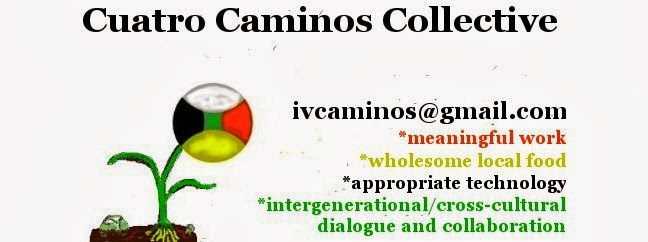![EcoFarm Logo]()
Genetic Engineering News List
|
|
|
|
NOTE: See also 'Gates Foundation Swimming Against a Tide of Informed Opinion'.
http://www.gmwatch.org/latest-listing/1-news-items/13481
---
---
Genetically Engineered Crops Will Not Feed The World
CFS, January 25 2012
http://truefoodnow.org/2012/01/25/genetically-engineered-crops-will-not-feed-the-world/
*The Center for Food Safety Pushes Back Against Gates Foundation "Feed the
World" Propaganda
The Center for Food Safety (CFS) pushed back today against longtime biotech crop
supporter, the Bill and Melinda Gates Foundation, over its announcement that it
has invested nearly $2 billion in a campaign to fund the development of
genetically engineered (GE) crops in an attempt to address global hunger. The
Gates Foundation has been widely criticized by food security and public interest
groups for promoting GE crops in developing countries rather than investing in
organic and sustainable local models of agriculture.
"The biotech industry has exploited the image of the world's poor and hungry to
advance a form of agriculture that is expensive, input-intensive, and of little
or no relevance to developing country farmers," said Andrew Kimbrell Executive
Director for the Center for Food Safety. "It's long past time that the Gates
Foundation redirect its investments in biotech companies like Monsanto, and its
funding of dead-end GE crop projects, to promote agroecological techniques with
a proven record of increasing food production in developing countries."
Since their introduction in the mid-90s, developers of GE crops have claimed
their crops will reduce agriculture's environmental footprint, provide benefits
to farmers and meet the needs of a hungry planet. Yet across the board GE crops
have failed to deliver results. GE crops have remained an industrial tool
dependent upon costly inputs, such as patented seeds and synthetic pesticides
and fertilizers, that farmers in the most food insecure regions can ill-afford.
For instance, 5 out of every 6 acres of GE crops worldwide are
herbicide-resistant varieties designed explicitly to increase dependence on
expensive herbicides, and this remains the major R&D focus of the industry.[i]
In contrast, the emerging consensus of international development experts is that
real solutions to addressing global hunger must be inexpensive, low-input and
utilize local/regional resources as much as possible[ii] - all areas where GE
crops fail to deliver. For instance, the UN and World Bank's 2008 International
Assessment of Agricultural Knowledge, Science and Technology for Development
(IAASTD), which engaged some 400 experts from multiple disciplines, concluded
that biotech crops have very little potential to alleviate poverty and
hunger.[iii] Instead, IAASTD recommended support for agroecological approaches
and food sovereignty.
In 1998, African scientists at a United Nations conference strongly objected to
Monsanto's promotional GE campaign that used photos of starving African children
under the headline "Let the Harvest Begin." The scientists, who represented many
of the nations affected by poverty and hunger, said gene technologies would
undermine the nations' capacities to feed themselves by destroying established
diversity, local knowledge and sustainable agricultural systems.[iv]
Developing nations also object to seed patents, which give biotech firms the
power to criminalize the age-old practice of seed-saving as "patent
infringement." Thousands of U.S. farmers have been forced to pay Monsanto tens
of millions of dollars in damages for the "crime" of saving seed.[v] Loss of
the right to save seed through the introduction of patented GE crops could prove
disastrous for the 1.4 billion farmers in developing nations who depend on
farm-saved seed.[vi]
It is increasingly understood that poverty, inadequate access to land and food,
and unfair trade policies are the major causes of hunger in the world, rather
than absolute shortage of food. Additional factors contributing to food
insecurity include declining investments in infrastructure (storage facilities,
roads to markets) and increased diversion of food crops for biofuels and animal
feed. The UN World Food Program notes many farmers in developing countries
cannot afford seed or other materials for crop production,[vii] so GE seeds,
which cost twice to over six times the price of conventional seed, are even less
affordable.
# # #
The Center for Food Safety is a national, non-profit, membership organization
founded in 1997 to protect human health and the environment by curbing the use
of harmful food production technologies and by promoting organic and other forms
of sustainable agriculture. More information can be found at
www.centerforfoodsafety.org
[i] CFS-FOE (2008). "Who Benefits from GM Crops: The Rise in Pesticide Use,"
Center for Food Safety and Friends of the Earth International, 2008.
http://www.centerforfoodsafety.org/2008/02/13/genetically-modified-gm-crops-increase-pesticide-use-and-fail-to-alleviate-poverty-reveals-new-report/
[ii] United Nations Environment Programme - United Nations Conference on Trade
and Development. 2008. Organic Agriculture and Food Security in Africa.
UNCTAD/DITC/TED/2007/15. ; United Nations and World Bank (2009) The
International Assessment of Agricultural Knowledge, Science and Technology for
Development (ISTAAD). Island Press. Washington, D.C.
[iii] Sullivan, D. (2008). "Groundbreaking report offers holistic remedies for
famine relief and environmental protection in developing countries," The Rodale
Institute, April 18, 2008. http://www.rodaleinstitute.org/20080418/fp1; for
report and commentaries, see: www.agassessment.org
[iv] "Let Nature's Harvest Continue!" African Counter Statement to Monsanto, at
the 5th Extraordinary Session of the FAQ Commission on Genetic Resources, June
12, 1998.
[v] CFS (2005 & 2007). "Monsanto vs. U.S. Farmers," Center for Food Safety,
2005; updated 2007. http://www.centerforfoodsafety.org/campaign/genetically-engineered-food/crops/other-resources/monsanto-vs-u-s-farmers-report/
[vi] Grain (2007) The End of Farm-saved Seed? Industry's Wish List for the Next
Revision of UPOV, February 2007. http://www.grain.org/briefings/?id=202
[vii] World Food Programme of the United Nations, Website "What Causes Hunger?"
Accessed March 25, 2010. http://www.wfp.org/hunger/causes
|
| The Genetic Engineering Blog is produced by Thomas Wittman and EcoFarm, and supported by a generous donation from the Newman's Own Foundation. Please pass this vital information on. If you would like to get on this list go to www.eco-farm.org and select Blogs. |
|
|
|
|
|
|
Ecological Farming Association | 406 Main Street, Suite 313 | Watsonvillle | CA | 95076
|
![]()
--
Cuatro Caminos Collective
*Meaningful Work,
*Wholesome Local Food,
*Appropriate Technology,
*Intergenerational/Cross-Cultural Dialogue and
Cooperation
ivcaminos.blogspot.com
562-448-2619

No comments:
Post a Comment